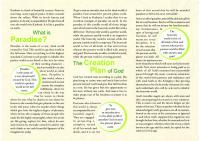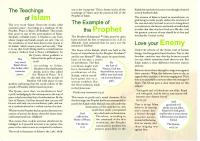Peace in the Qur'an 8588822672, 9790853944
132 34
English Pages [2]
Recommend Papers
File loading please wait...
Citation preview
The Power of Peace According to a Hadith, “God grants to gentleness what He does not grant to harshness.” That is to say, peaceful activism is distinctly superior to violent activism. There is nothing to be achieved in war and violence, save death and destruction. On the contrary, an atmosphere of peace enables normal relations to be established between people. It makes it possible for feelings of love and friendship to prevail. In a favourable atmosphere constructive activities flourish and the existing resources can be used for development or other God creative activities. grants to gentleness what A positive bent of He does not grant to mind wil l pre vail harshness. which will help develop academic The Prophet a nd intellectual œ Muhammad advancement. That is why Islam teaches us to avoid war and confrontation at all costs and commands us to establish peace to the greatest possible degree.
Clarification of a Fallacy There are certain verses in the Quran, which convey injunctions similar to the following: ‘Kill them wherever you find them.’ (2:191) Referring to such verses, there are some who attempt to give the impression that Islam is a religion of war and violence. This is totally untrue.
Peace in the Quran
This division of commands into different categories is a natural one and is found in all religious books. Jesus Christ said: “Do not think that I came to bring peace on Earth. Islam I did not come to is a religion of bring peace, but a peace in the fullest sword.” (Matthew, sense of the word. Chapter 10) The Qur’an calls its way It would not be ‘the paths of peace’. It right to conclude describes reconciliation that the religion as the best policy. preached by Christ was one of war and violence, for such utterances relate purely to particular occasions. So far as general life is concerned, Christ taught peaceful values, such as the building up of a good character, loving each other, helping the poor and needy, etc. Islam is a religion of peace in the fullest sense of the word. The Qur’an calls its way ‘the paths of peace’ (5:16). It describes reconciliation as the best policy (4:128), and states that God abhors any disturbance of the peace (2:205). Maulana Wahiduddin Khan
Center for Peace and Spirituality USA 2665 Byberry Road Bensalem, PA 19020 Cell: (617) 960-7156 [email protected]
Goodword Books 1, Nizamuddin West Market New Delhi-110 013 Tel. +9111-4182-7083, Mob. +91-8588822672 [email protected]
Center for Peace and Spirituality 1, Nizamuddin West Market New Delhi-110 013 [email protected]
Goodword Books, Chennai 82/324, Triplicane High Road, Triplicane Chennai 600005 Mob. +91-9790853944
www.cpsglobal.org www.alquranmission.org www.goodwordbooks.com
6
The Teachings of Islam The very word ‘Islam’ (from the Arabic silm) connotes peace. According to a tradition of the Prophet, ‘Peace is Islam’ (Al-Bukhari). This means that peace is one of the prerequisites of Islam. Similarly, a Hadith states: A Muslim is one from whose tongue and hands people are safe. One of the attributes of God described in the Quran is ‘As-Salam’, which means peace and security.’ That is to say that God’s Being itself is a manifestation of peace. Indeed, God is Peace (Al-Bukhari). In the Quran, divine guidance is likened to the paths of peace. The (5:16) very word ‘Islam’ (from the Arabic silm) connotes peace.
Ac c o r d i n g t o Is l a m , Paradise is the ideal human abode, and is thus called the ‘Home of Peace.’ It is also said that, the people of Paradise will wish peace to one another, indicating that the social culture of the people of Paradise will be based on peace. The Quran, avers that, ‘reconciliation is best’ (4:128), and judging by the consequences, the way of peace is far better than that of confrontation. By the Law of Nature, God has decreed that success will be met with only on a reconciliatory path, and not on a confrontational or a violent course of action. Whenever the Prophet had an option between two courses of action, he always chose the easier (nonconfrontational) one. (Bukhari) This means that, violent activism should not be indulged in if peaceful activism is an option. For, peace is the easier course as compared to violence. The truth is that peace in Islam is the ‘rule’, while
war is the ‘exception’. This is borne out by all the teachings of Islam and the practical life of the Prophet of Islam.
The Example of the Prophet The Prophet Muhammad œ (May peace be upon him) received his first revelation in 610 A.D. in Makkah. God ordained that he carry out the mission of Tawheed. The house of the Kabah, which was built as the house of monotheism by the Prophet Abraham# and his son Ishmael# (May peace be upon them), later on became a centre By of polytheism. The first the Law of revelation might well Nature, God has have demanded the decreed that success purification of the will be met with only Kabah, which would on a reconciliatory have given rise to a path. serious problem. But the first revelation made in the Quran was: Purify your vestments (74:4). This means to purify one’s moral character. If, in the first stage, the Prophet had been commanded to purify the Kabah while Makkah was still under the domination of the unbelievers, this would have surely precipitated into clash and confrontation. God Therefore, according to calls to the the command of the first Home of Peace. revelation, the Prophet The Quran, continued to perform his 10:25 prayers peacefully in the
Kabah for a period of 13 years, even though it housed several hundred idols. The mission of Islam is based on monotheism, its goal being to make people realize the existence of the one and only God and to strive to bring about a revolution in the hearts and minds of individuals in order that they may love God as is His due. And the greatest concern of man should be to fear and worship his Creator (2:165).
Love your Enemy Under the scheme of the divine trial of human beings, God has granted man freedom. Due to this freedom, enmities may develop between people (20:123), which sometimes lead them to war. But Islam makes a clear difference between enmity and war. Believers do not have the right to wage wars against their enemies. What the believers have to do, as regards their enemies, is far from waging war. Their duty is to peacefully convey to them the message of Islam. The Quran gives a clear injunction on this subject: “And good and evil deeds are not alike. Repel evil with good. And he who is your enemy will become your dearest friend.” (41:33-34) And That is to say, Islam good and evil believes in turning deeds are not alike. one’s enemy into Repel evil with good. a friend through And he who is your enemy will become your dearest peaceful means, friend. instead of declaring him an enemy and The Quran, then waging war 41:33-34 against him.










